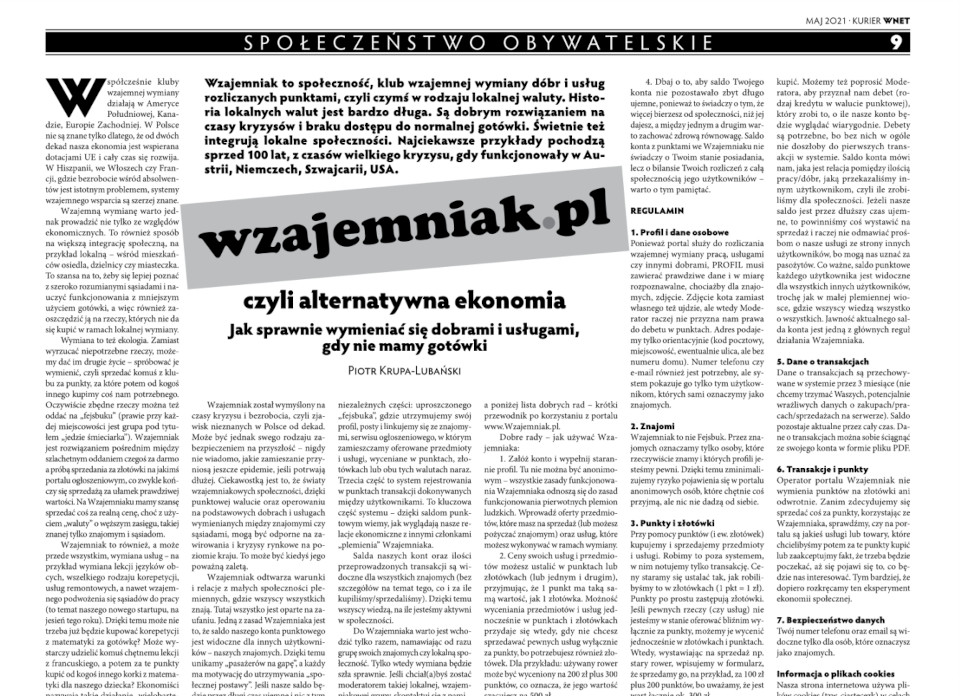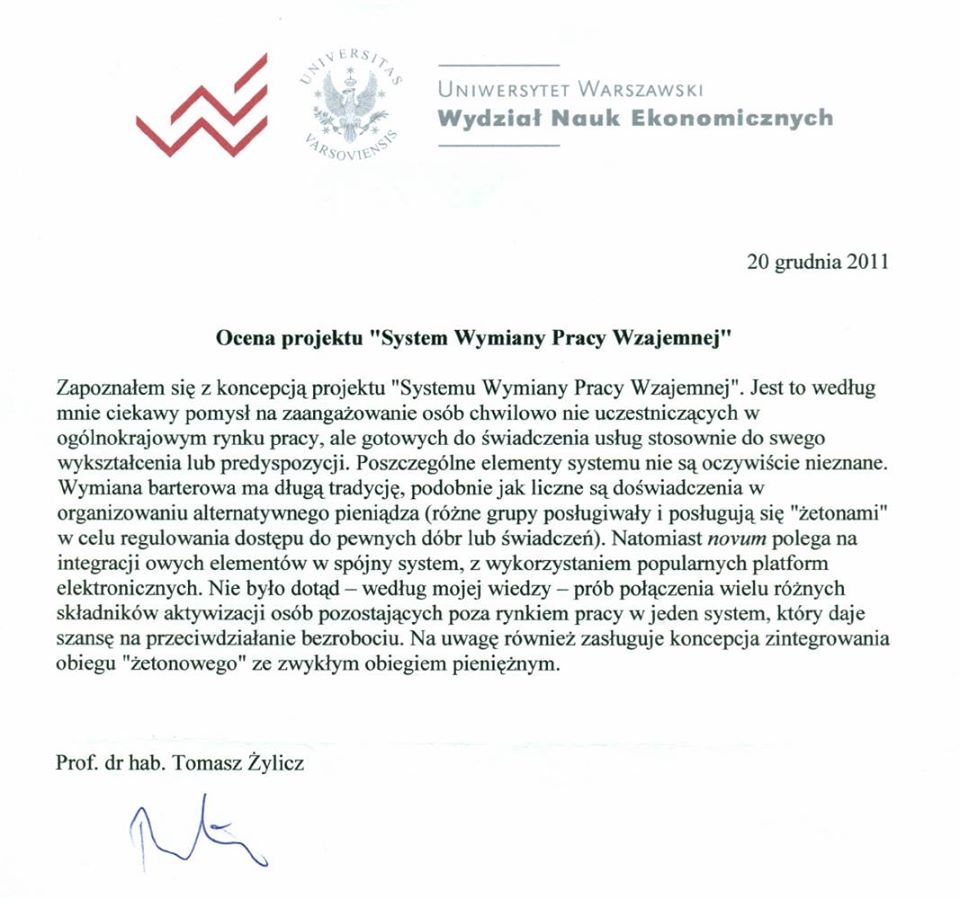History :
Wzajemniak.pl – alternative economy
How to efficiently exchange goods and services without money
Wzajemniak is a community – or a club – created to facilitate the exchange of goods and services hose value is counted in points serving as a kind of a local currency. The history of local currencies is very long; they are a good solution for times of crisis and money shortage. They also tend to unite local communities. The most interesting examples of local currencies date back to around 100 years ago, that is to the period of the Great Depression, when they were in use in Austria, Germany, Switzerland or the USA.
Nowadays, the exchange clubs exist in South America, Canada or Western Europe. They aren’t well known in Poland due to the growing economy which have been supported by EU funds for the past 20 years. In Spain, Italy or France, where the unemployment among graduates is a serious issue, systems of mutual support are far more common. However, exchange systems are worth trying for more than economic reasons. They can unite residents of neighbourhoods and towns. They provide an opportunity to meet people from the same community and learn how to spend less money so that we can pay for goods that cannot be obtained through the exchange system.
Exchanging means also caring for the environment. Instead of throwing away things we don’t need anymore, we can give them a second life by exchanging or, in other words, selling them for points which later can be used to buy something else from another club member. Of course, we can always just give these things away on other social media platforms (for example, on facebook, we can find a lot of local groups usually called “śmieciarka jedzie”). Wzajemniak is a halfway solution between a noble giveaway and selling something, usually way below its real price range. On our website, we have a chance to sell things for their real value but by using a currency known only to other members.
Wzajemniak is first and foremost meant for exchanging services, such as language lessons, tutoring, repair services or even carpooling (and that will be a subject of our next startup – coming this autumn). Maybe now you won’t have to pay for Maths lessons in cash? Instead, you can teach someone French and gain points to pay for tutoring in Maths for your child. In economy, this kind of exchange is called a multibarter, but in reality, it is just a regular transaction using a money substitute – it’ s a bit like playing Monopoly. However, the money substitute (that is points) we are given at the beginning of our Wzajemniak adventure is not really a donation, it’s more of a loan. And that is the main point of Wzajemniak – in real world lack of money can make it harder to function in a society, but in Wzajemniak’s world, if we have anything to exchange, even if it’s just our time, money stops being a problem, it stops being a limitation.
Wzajemniak was created for times of crisis and widespread unemployment, issues hardly present in Poland for decades. It can be, however, a safeguard for the future – who knows what kind of turmoil will be caused by the pandemic if it lasts any longer. What is worth noting, Wzajemniak’s communities might be immune to economic crisis and other economic turbulences on national level. This great advantage arises from Wzajemniak’s points currency and from the fact that it’s meant for exchanging basic goods and services between acquaintances and neighbours.
Wzajemniak copies relations from „primitive” societies where everyone knows each other and everything is based on mutual trust. One of the Wzajemniak’s rules is that our point balance is visible to the users marked as our friends, which helps to avoid free riders and creates a motivation for everyone to maintain a right social attitude. If our balance is negative for a long time, meaning we do not sell anything nor provide any services, our friends will clearly see we are a bit of a parasite. It’s like a family or a village – everyone knows each other business and it helps to motivate us to give to our community as much as we take from it, which helps to make sure our balance doesn’t stay negative for too long. These are the basic rules of social economy.
Wzajemniak consists of three parts: one with our profile, posts and friends; one with advertisements of offered goods and services, priced in points, PLN, or both; one with transaction register. The third part is the most important – thanks to the point balance we know how our economic relations with other Wzajemniak community members look like.
Our balance and the number of transactions are visible to our friends without particular details (that is what and for how many points we have bought/sold). It allows everyone to see how active we are in the community.
It’s worth joining Wzajemniak together with a group of friends or neighbours, as it will create more opportunities for swift exchanges. If you would like to become a moderator for your local Wzajemniak group, do not hesitate to contact us.
Wzajemniak został założony przez kilkuosobowy zespół Fundacji Demokracji Bezpośredniej (KRS 400498, nasz adres to: www.demok.pl/fundacja, budujemy, między innymi, systemy internetowe do demokracji lokalnej, na przykład: www.Podkowa.Demok. p! - podobny możemy uruchomić też w Twojej miejscowości, skontaktuj się z nami). Był też wielokrotnie konsultowany z ekonomistami z Uniwersytetu Warszawskiego oraz Polskiej Akademii Nauk.
Wzajemniak was founded by a small team from Fundacja Demokracji Bezpośredniej – Direct Democracy Fundation (KRS 400498, www.demok.pl/fundacja – we create, among others, online systems for local democracy, for example www.Podkowa.Demok.pl – we can launch one in your town too, contact us if you are interested). The project was consulted with economists from the University of Warsaw and from the Polish Academy of Sciences at multiple stages.
We invite you to join us. Below you can find a short guide that will help you start your adventure with Wzajemniak.pl.
How to use Wzajemniak efficiently:
Create your account and fill in your profile. Here you cannot be anonymous as Wzajemniak is based on small community social rules. Create advertisements for things you have for sale (or are willing to borrow) and services you can provide.
Goods and service prices can be set in points or PLN (or both), given that 1 point has the same value as 1 PLN. The ability to price things in both points and PLN is useful when you do not want to sell certain goods or service only for points because you need also PLN. For example, second-hand bike may be priced for 200 PLN and 300 points, which means that its value amounts to 500 PLN.
Find your friends and connect with them. If you trust them, give them a recommendation and ask them to do the same for you. It will allow the administrator to give you a certain amount of points in a form of a right to have a negative balance. Your profile must be more or less completely filled in beforehand. Invite your friends to join Wznajemniak, as only with a lot of members we can have the access to all the goods and services that we might need.
Make sure that your balance does not stay negative for too long as it will mean that you take from the community more than you are willing to give, and it is crucial to maintain equilibrium between the two. It is important to remember that your balance does not define how much you own but whether you give back to the community as much as you take from it.
"Jak działa Wzajemniak - Kurier Wnet 2021"
(Kliknij aby pobrać pełną treść artykułu)

20 December 2011
„Mutual Work Exchange System” Project Evaluation
I got acquainted with the concept of "Mutual Work Exchange System". In my opinion, this is an interesting idea for the involvement of people who temporarily do not participate in the labour market, but are ready to provide services according to their education or skills. Of course, the individual components of the system are not unknown. Barter exchange has a long tradition, much like how numerous are the attempts of organizing alternative money (various groups have used and use "tokens" to regulate access to certain goods or benefits), while the novum is the integration of these elements into a coherent system, using popular platforms. To my knowledge, there have been no attempts of combining so many different components of activating people outside the labour market into one system that gives a chance to counteract unemployment. The concept of integrating the "token" circuit with the ordinary money circuit deserves attention as well.
Prof. dr. hab. Tomasz Żylicz
Początki Wzajemniaka - rok 2011
